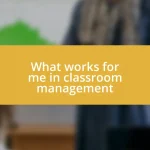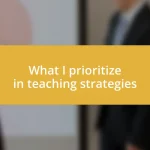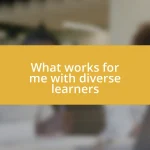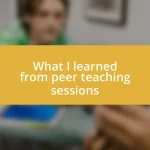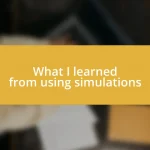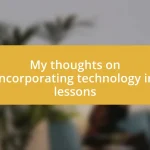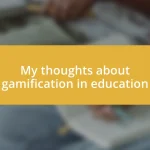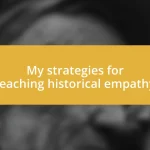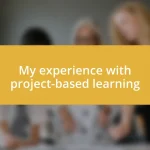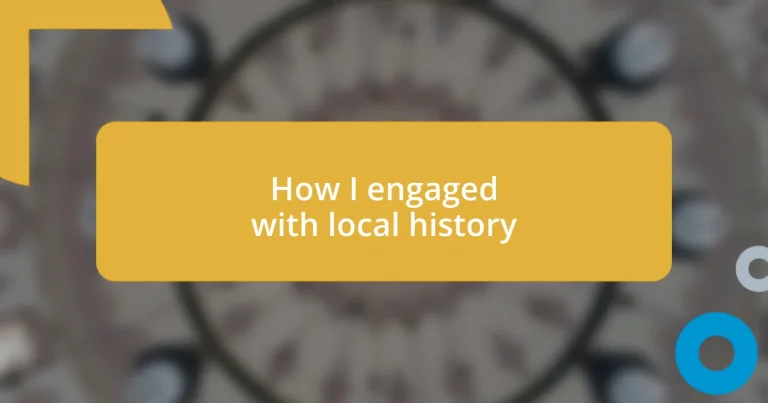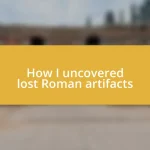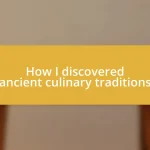Key takeaways:
- Engaging with local history fosters community identity, belonging, and interconnectedness among residents.
- Utilizing resources like local libraries, historical societies, and online archives enhances understanding of community heritage.
- Sharing personal historical experiences and findings with the community creates connections and enriches collective narratives.
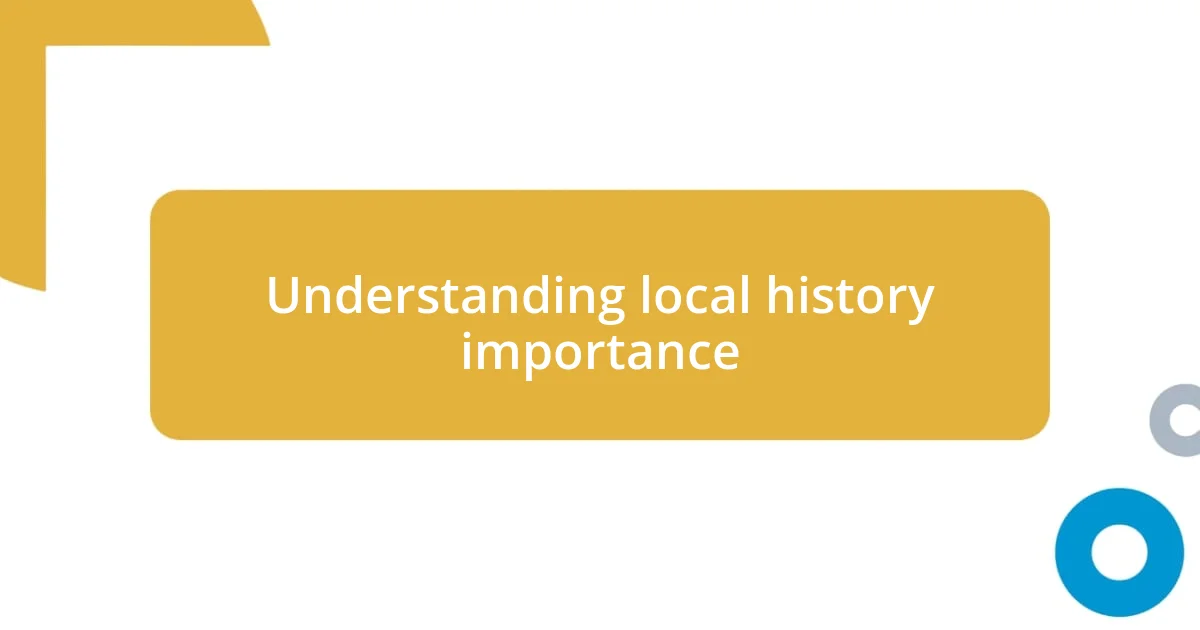
Understanding local history importance
Understanding local history isn’t just an academic exercise; it’s a bridge to our community’s identity. I vividly remember the first time I wandered through a local museum and stumbled upon artifacts from my town’s founding days. It struck me—how many people walk by these remnants of our past without realizing their significance? Engaging with local history allows us to appreciate the stories that shape our lives today.
Local history weaves a narrative that connects generations. I recall attending a local storytelling event where an elder shared tales of their childhood during a significant historical moment in our community. Listening to their voice, full of emotion and nostalgia, made me realize how interconnected we all are. Isn’t it fascinating how one person’s experience can resonate across time, enriching our understanding of who we are?
Additionally, understanding local history fosters a sense of belonging. When I volunteered at a community history project, I felt more connected to my neighbors. We all have our unique stories, yet there’s a shared thread that unites us. It begs the question—how can we fully engage with our community if we don’t understand the history that binds us? This connection empowers us to build a stronger, more inclusive future together.
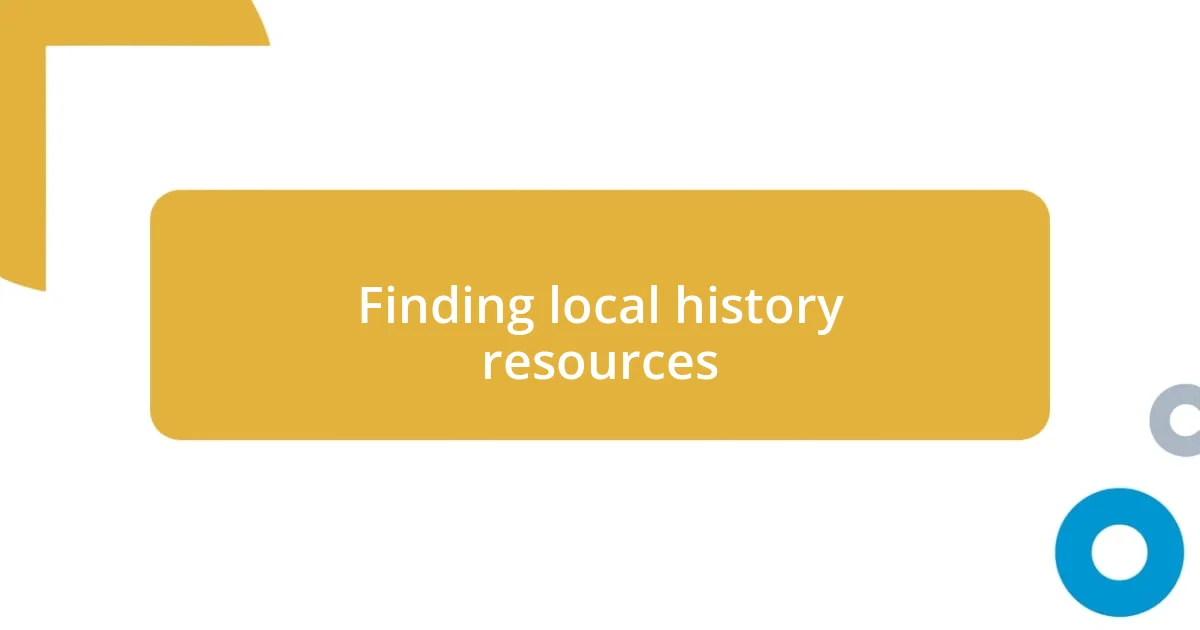
Finding local history resources
Finding local history resources can feel overwhelming at first. I remember rummaging through dusty old books at the local library, feeling a deep connection to the stories they held. It was like uncovering whispers from the past—so many narratives waiting to be explored. Local libraries often house archives, photographs, and documents that can be the perfect starting point for anyone looking to dive into their community’s history.
Another valuable resource I’ve found is local historical societies. During my search for more information about a historic home in my area, I was welcomed with open arms by the society’s volunteers. They passionately shared their well-organized collections and led me to primary sources that truly enriched my understanding. Have you ever experienced that moment when all the pieces of a puzzle fall into place? That’s how I felt when I found artifacts related to my community’s heritage through these dedicated groups.
Online resources can also be treasure troves. I distinctly remember stumbling upon a digital archive of local newspapers while seeking newspaper clippings about local events. These scans not only provided me with facts but also allowed me to witness the sentiments and context of the time. It was a wonderful blend of nostalgia and learning, reminding me that history is always at our fingertips if we know where to look.
| Resource Type | Description |
|---|---|
| Local Libraries | Often house historical archives, photographs, and documents. |
| Historical Societies | Offer passionate insights and access to primary sources connected to local history. |
| Online Archives | Provide digital access to newspapers and other documents for easier research. |
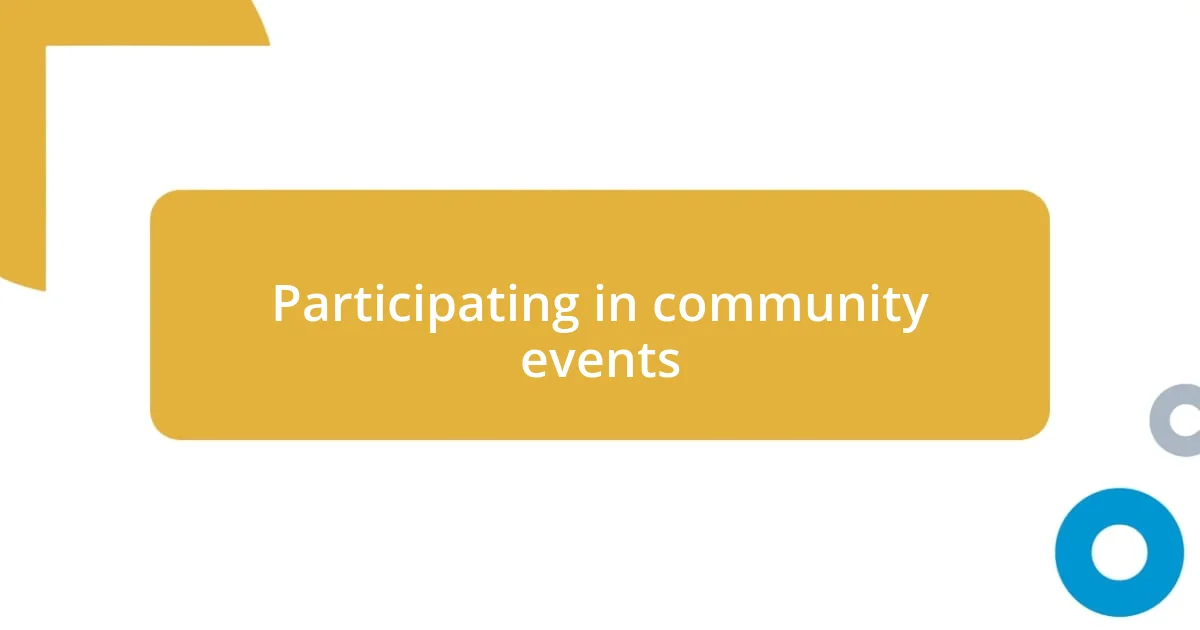
Participating in community events
Participating in community events has been one of the most rewarding ways for me to engage with local history. I still remember standing in my town square during a historical reenactment. The air was filled with laughter and excitement as people dressed in period costumes shared stories about lives lived long before us. Witnessing that spirit of camaraderie made me feel like I was part of something much larger, a living tapestry of our community’s heritage.
Here are some events that can connect you to local history:
- Historical Reenactments: These events bring the past to life, allowing attendees to witness and experience history firsthand.
- Heritage Festivals: Often filled with food, crafts, and music, these festivals celebrate cultural traditions and foster a sense of community pride.
- Local History Talks: Engaging lectures and discussions give insights into the rich narratives of the area, often presented by local historians or passionate community members.
- Guided Tours: Walking tours led by knowledgeable guides can unveil hidden gems and stories, providing a deeper appreciation for the local landscape.
I often find that these gatherings uncover new layers of understanding. At a local heritage festival, I stumbled upon a booth showcasing traditional crafts. The artisans were happy to share their techniques and the stories behind each piece. It struck me how these practices connect us to our ancestors, preserving their skills and passions. I left feeling a renewed sense of pride in my community and its vibrant history. Engaging with these events offers a portal back in time, reminding us of the rich narratives that continue to shape our lives today.
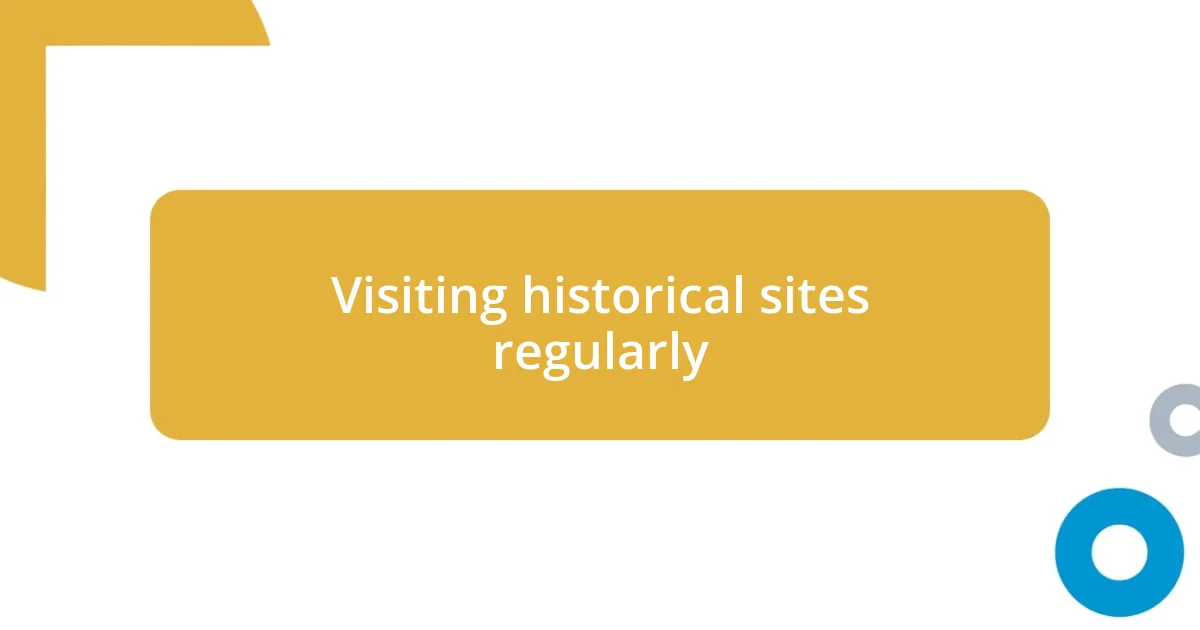
Visiting historical sites regularly
Visiting historical sites regularly has become a cherished part of my routine. I recall the first time I stepped into an old battlefield – the whispers of history seemed to echo around me. As I wandered through the fields, it felt surreal to think about the lives that intersected there long ago. Each visit unveils stories and emotions that textbooks simply can’t capture. Isn’t it amazing how a place can stir so many feelings within us?
I often make a point to return to the same site, and each time, I uncover something new, whether it’s a small detail I missed or fresh insights from interpretive signs. There was a day when I discovered a hidden trail at a historic park that led to a small monument. Standing there, I realized how easy it is to overlook the little things that add depth to our understanding. Have you ever had a moment where you felt like something clicked, revealing a layer of history you had previously missed?
What I particularly love is how these sites foster connections with others who share a passion for history. The conversations that spark between visitors can transform the experience as we exchange thoughts and discoveries. I remember discussing the significance of a local landmark with a fellow history enthusiast, and it opened my eyes to perspectives I had never considered. It’s these rich interactions that make visiting historical sites feel like a treasure hunt, where each discovery leads to a deeper relationship with our heritage.
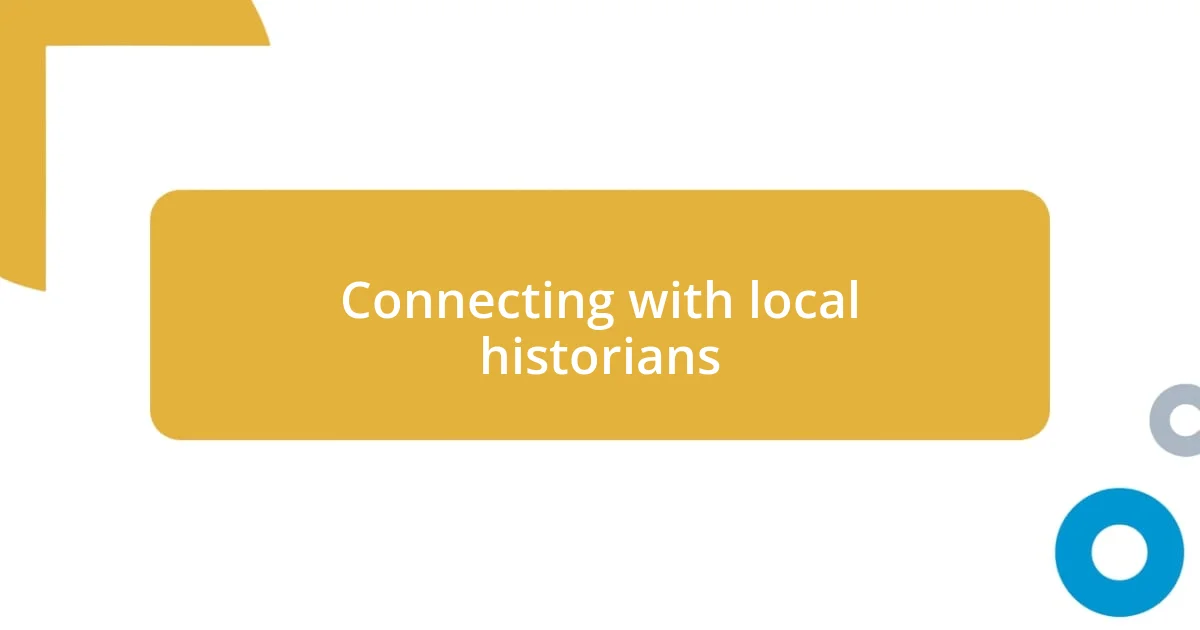
Connecting with local historians
Connecting with local historians has been one of the most enlightening experiences on my journey into local history. I distinctly remember a rainy Saturday when I attended a small workshop hosted by a local historian. As I listened to their passionate recounting of our town’s past, it dawned on me how crucial these figures are in preserving our narratives. Have you ever felt the thrill of hearing a story that suddenly makes the past come alive?
One evening, I joined a discussion group at the library where a historian shared firsthand accounts from residents who lived through significant events in our area. I was captivated by the vivid details: the way their voices shifted when recounting a moment of joy or sorrow. This unique access to personal experiences helped me see history as more than dates and events; it was a tapestry woven with human emotion. It made me wonder—how often do we overlook the voices that could enrich our understanding of history?
The value of connecting with local historians lies not just in their knowledge but in the relationships forged through sharing stories. After several meetings, I grew comfortable enough to ask questions that had been on my mind. One day, I asked about the challenges faced in documenting our area’s history. The response opened a dialogue about preservation efforts and the community’s responsibility in safeguarding our heritage. I left that gathering feeling more connected to my community, knowing that our shared history is in our hands to protect and interpret.
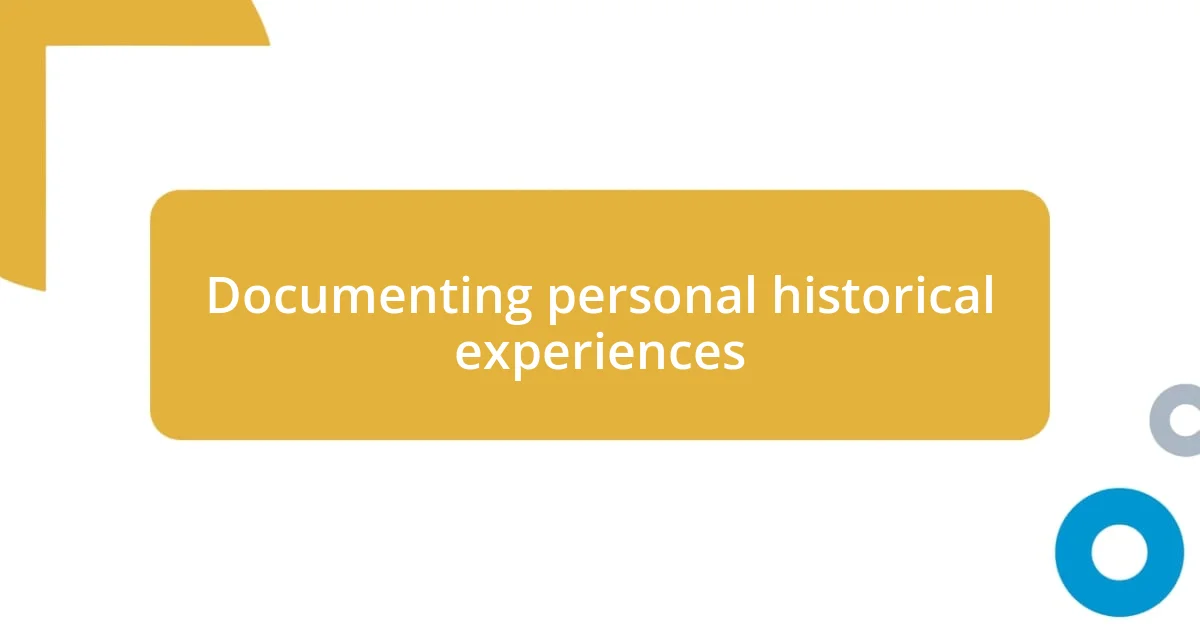
Documenting personal historical experiences
Documenting personal historical experiences can be a profound journey. I remember sitting down one Sunday with my journal, reflecting on my visits to a historic village. As I wrote about the sights and sounds that captivated me, it struck me how these snapshots of my experiences serve as a personal archive. Isn’t it fascinating how our mundane moments can bear witness to history, transforming into narratives that capture the spirit of a place?
One of my favorite moments came when I decided to create a scrapbook. I filled it with photographs, anecdotes, and even sketches of my experiences at various historical sites. Each page came alive with stories—like the time I stumbled upon an old blacksmith shop. The heat from the forge, the sound of metal striking metal, and the friendly chat with the blacksmith brought history into my hands. I found myself wondering, how often do we take the time to capture these fleeting moments that tie us to our past?
I’ve also started recording oral histories from older community members, jotting down their memories during casual conversations. It’s incredible to see their eyes light up as they recount stories that shaped our town. One gentleman recounted how he and his friends used to play on the very streets where our farmer’s market now stands. These stories remind me that history isn’t just about the famous events or figures; it’s about the everyday lives that weave together our collective narrative. What treasures are waiting to be uncovered in your own community’s stories?
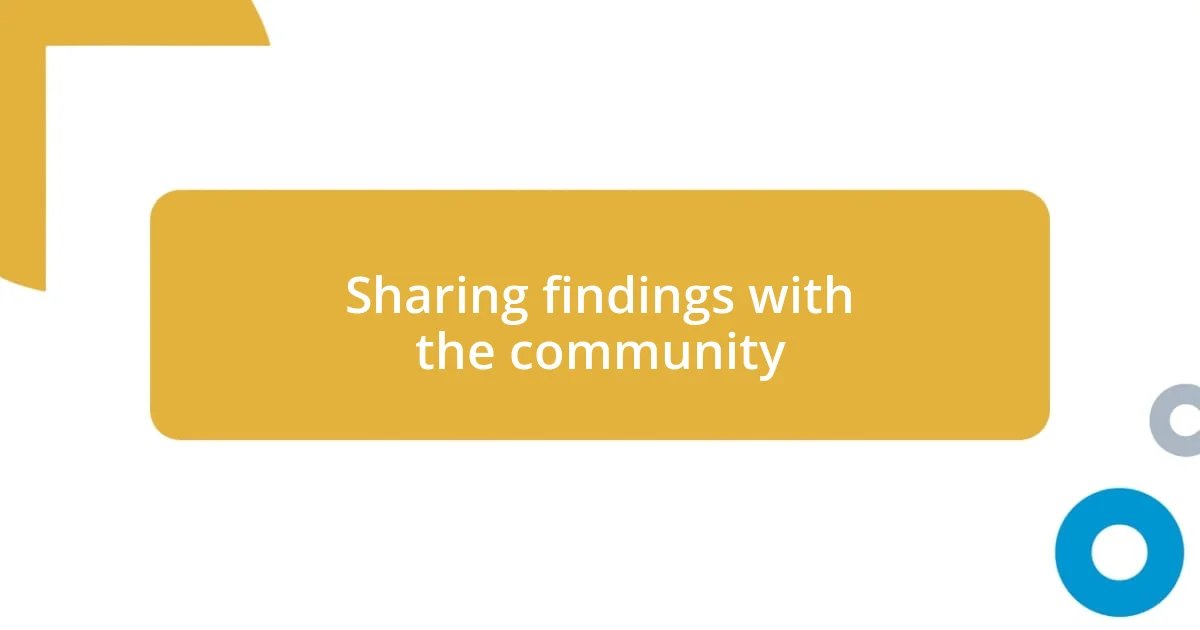
Sharing findings with the community
Sharing my findings with the community has become a fulfilling chapter in my local history journey. After gathering stories and insights, I arranged a small presentation at our local café. The atmosphere was cozy, and I remember feeling a mix of excitement and nerves as I shared my discoveries about our town’s hidden past. The moment I saw familiar faces nodding in recognition or leaning in with curiosity, I knew that these stories were resonating. Isn’t it incredible how sharing knowledge can spark connections?
As word spread, I started receiving messages from neighbors who wanted to contribute their own stories. One afternoon, a lovely woman named Marie reached out, eager to discuss her grandfather’s role in the town’s early years. Our conversation was rich with detail, from the way she painted her grandfather’s character to the significance of his actions that shaped our community today. I found myself reflecting—and isn’t it inspiring how these personal histories can intertwine, creating a more robust narrative?
One of my proudest moments came when we decided to compile these shared stories into a community newsletter. It transformed our discussions into tangible legacies, allowing everyone’s voice to be heard. I relished watching people eagerly flip through the pages, recalling their own memories sparked by what they read. It made me wonder how many more community stories are out there, waiting to be featured and celebrated. Wouldn’t it be amazing if we could create even larger platforms to share our local history?

